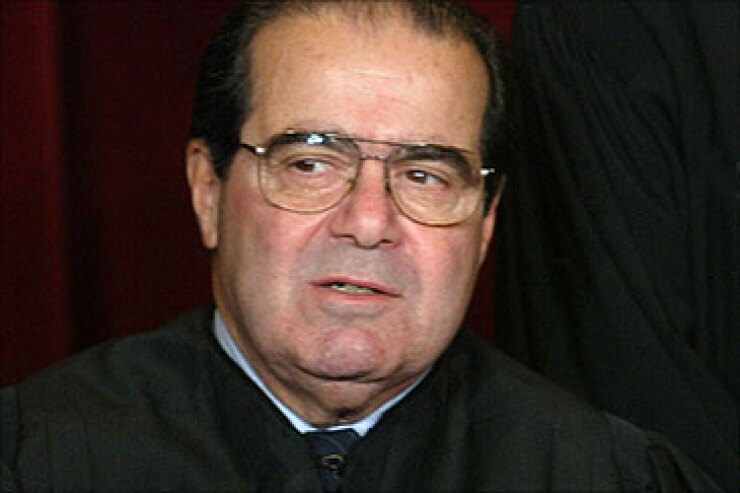
WASHINGTON — Lawyers and others following separate Puerto Rico cases on sovereignty and debt restructuring that are pending before the Supreme Court are divided about how the death of Justice Antonin Scalia might affect the forthcoming rulings.
Scalia's death last weekend leaves the court with eight members considered to be split evenly along partisan lines. One of the cases, Puerto Rico v. Sanchez Valle, asks the court to weigh the extent to which Puerto Rico is sovereign from the U.S. The high court already heard oral arguments in that case on Jan. 13. The other case, Puerto Rico v. Franklin California Tax-Free Trust, deals with a local Puerto Rico debt restructuring law for the commonwealth's public authorities that lower courts have deemed illegal. The oral argument for that case is scheduled for March 22.
Justice Samuel Alito previously recused himself from the court's consideration of whether to accept the restructuring case because he reportedly has investments in funds holding Puerto Rico bonds. He would likely recuse himself from the case's oral argument if he has not divested those investments by March. Scalia's death and Alito's recusal would leave the justices who are considered more conservative in the minority.
Eric LeCompte, executive director for Jubilee USA Network, said the more liberal justices are more likely to side with Puerto Rico on the legality of its restructuring law and increase the possibility that the lower courts' decisions will be reversed. The liberal justices are also expected to be more sympathetic to Puerto Rico's arguments that it has more sovereignty from the U.S. in a case involving two individuals who want to claim double jeopardy.
Matthew McGill, a partner at Gibson, Dunn & Crutcher, is the lead counsel for BlueMountain Capital, which along with Franklin Templeton and Oppenheimer are challenging Puerto Rico's restructuring law.
At a seminar on Puerto Rico sponsored by EMTA in New York, McGill said the restructuring case would be the first time in a long time that a predominantly liberal Supreme Court would hear oral arguments in a case.
However, McGill said he doesn't think the case would be decided along liberal and conservative lines. It would instead be decided on the law, he said.
James Spiotto, managing director of Chapman Strategic Advisors in Chicago, agreed with McGill, saying the basic tenants of the Constitution and federal law are still the same as they were before Scalia's death. The decision in both cases is more likely to be based on the legal interpretation of whether Puerto Rico has a sovereign status and whether Puerto Rico's restructuring law is illegal because it contradicts federal bankruptcy law, he said.
"We maybe put too much emphasis on what the perceived political persuasion of a justice may be," Spiotto said. "If you talk about what the court does and what the justices decide, it [has] less [to do with] political persuasion and more [to do with] their perceptions of the law and their application of the law to those principles."
The Puerto Rico v. Sanchez Valle case hinges on whether Puerto Rico and the federal government are separate sovereigns for purposes of the U.S. Constitution's double jeopardy clause, which prevents a defendant from being tried again on the same or similar charges in the same case following a legitimate acquittal or conviction.
Donald Verrilli, the U.S. solicitor general, filed a controversial "friend of the court" brief on Dec. 23 that argued that Puerto Rico's transition to self-government between 1950 and 1952 did not change its constitutional status as a U.S. territory or give the territory sovereignty. Instead, Congress exercised its authority under the territory clause to authorize Puerto Rico to pursue self-government, under which local officials would exercise power under a framework approved by Congress, he said.
Puerto Rico Gov. Alejandro Garcia Padilla responded to Verrilli's brief by arguing in a letter that Congress gave Puerto Ricans the right to govern themselves by passing a law giving the commonwealth the "principle of government by consent." The governor added that Verrilli's argument was "misguided and should not prevail in the Supreme Court."
The Puerto Rico v. Franklin California Tax-Free Trust case involves the Puerto Rico Public Corporation Debt Enforcement and Recovery Act, which the commonwealth enacted last year to allow the its cash-strapped public authorities to restructure. The authorities, unlike most U.S. localities, don't have access to bankruptcy protection under Chapter 9. The funds are arguing that U.S. bankruptcy law preempts Puerto Rico's restructuring law.
A three-judge panel of the U.S. Court of Appeals for the First Circuit in Boston sided with a lower court in July, ruling in favor of the funds.
Robert Slavin contributed to this report.





